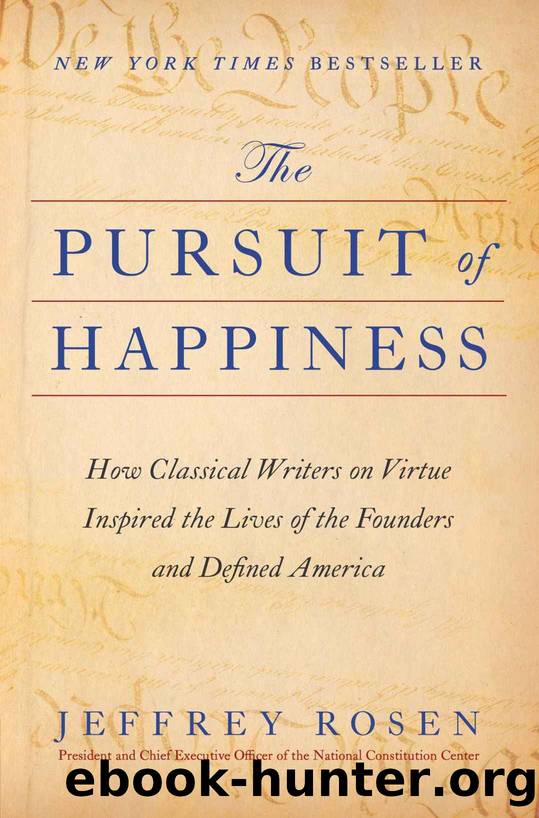The Pursuit of Happiness: How Classical Writers on Virtue Inspired the Lives of the Founders and Defined America by Jeffrey Rosen

Author:Jeffrey Rosen [Rosen, Jeffrey]
Language: eng
Format: epub
Tags: Biography & Autobiography, Historical, History, United States, Revolutionary Period (1775-1800), Modern, 18th Century
ISBN: 9781668002476
Google: ZpruEAAAQBAJ
Amazon: B0C7RNM8SL
Barnesnoble: B0C7RNM8SL
Goodreads: 177058814
Publisher: Simon & Schuster
Published: 2024-02-13T05:00:00+00:00
* * *
For this reason, Madison and Hamilton turned to the second of their institutional checks for the problem of faction: the separation of powers, or, as Hamilton called them, the âcounteracting passions.â36 The idea that rival passions could counteract one another arose in the seventeenth century, in the philosophy of Francis Bacon and Baruch Spinoza, and it was developed in the eighteenth by Scottish Enlightenment philosophers such as Hutcheson and Hume. The basic idea was that passions or emotions could not be eliminated but that the violent passions of the mind could be moderated or tempered when they were balanced against calmer ones. âNothing can oppose or retard the impulse of passion but a contrary impulse,â Hume wrote. When violent passions clash within the mind, he suggested, they might eventually cool into calmer ones, allowing us to pursue our true interests rather than be misled by our immediate desires: âWhat we call strength of mind implies the prevalence of the calm passions above the violent.â37
In a famous passage, Madison defends the separation of powers by invoking the principle of counteracting passions. âAmbition must be made to counteract ambition,â he wrote in âFederalist No. 51.â âThe interest of the man must be connected with the constitutional rights of the place.â38 Madison assumed that the president, Congress, and the judiciary would resist encroachments by the other branches on their powers because of their ambition to maintain their own power and prestige. Another application of the theory of counteracting passions comes in âFederalist No. 72,â where Hamilton talks about the president being restrained by the clashing forces of avarice and ambition within his own mind. Imagine a greedy president who is tempted to behave corruptly. If he thought his time in office was short, he might take everything he could get; but if he thought he might extend his time in office by winning reelection fair and square, he would try to serve the public interest rather than his own selfish interest, in order to increase his chances of being reelected. âHis avarice might be a guard upon his avarice,â Hamilton writes.39
In âFederalist No. 1,â Hamilton says that the Constitution will be a test of whether groups of people can govern themselves by reason rather than passionâwhether, as he puts it, societies âare really capable or not of establishing good government from reflection and choice, or whether they are forever destined to depend, for their political constitutions, on accident and force.â He then identifies â[a] torrent of angry and malignant passionsâ that will be âlet looseâ by the partisan debate over the Constitution. In particular, he singles out â[a]mbition, avarice, personal animosity, party opposition, and many other motives not more laudable.â40 In addition to ambition and avarice, a series of other malignant passions occur throughout The Federalist Papers, including pride, vanity, envy, jealousy, fear, resentment, self-love, and love of power.41
Hamilton and Madison explain repeatedly how malignant passions can usefully clash with one another, exhausting themselves in the process, so that decisions motivated by self-interest will ultimately coincide with the public interest.
Download
This site does not store any files on its server. We only index and link to content provided by other sites. Please contact the content providers to delete copyright contents if any and email us, we'll remove relevant links or contents immediately.
| Classical | Country & Folk |
| Heavy Metal | Jazz |
| Pop | Punk |
| Rap & Hip-Hop | Rhythm & Blues |
| Rock |
Cecilia; Or, Memoirs of an Heiress — Volume 2 by Fanny Burney(31956)
Cecilia; Or, Memoirs of an Heiress — Volume 3 by Fanny Burney(31942)
Fanny Burney by Claire Harman(26603)
We're Going to Need More Wine by Gabrielle Union(19046)
Plagued by Fire by Paul Hendrickson(17412)
All the Missing Girls by Megan Miranda(16027)
Cat's cradle by Kurt Vonnegut(15355)
For the Love of Europe by Rick Steves(14121)
Bombshells: Glamour Girls of a Lifetime by Sullivan Steve(14075)
Leonardo da Vinci by Walter Isaacson(13336)
4 3 2 1: A Novel by Paul Auster(12392)
The remains of the day by Kazuo Ishiguro(8999)
Adultolescence by Gabbie Hanna(8927)
Note to Self by Connor Franta(7671)
Diary of a Player by Brad Paisley(7581)
Giovanni's Room by James Baldwin(7346)
What Does This Button Do? by Bruce Dickinson(6207)
Ego Is the Enemy by Ryan Holiday(5448)
Born a Crime by Trevor Noah(5382)
